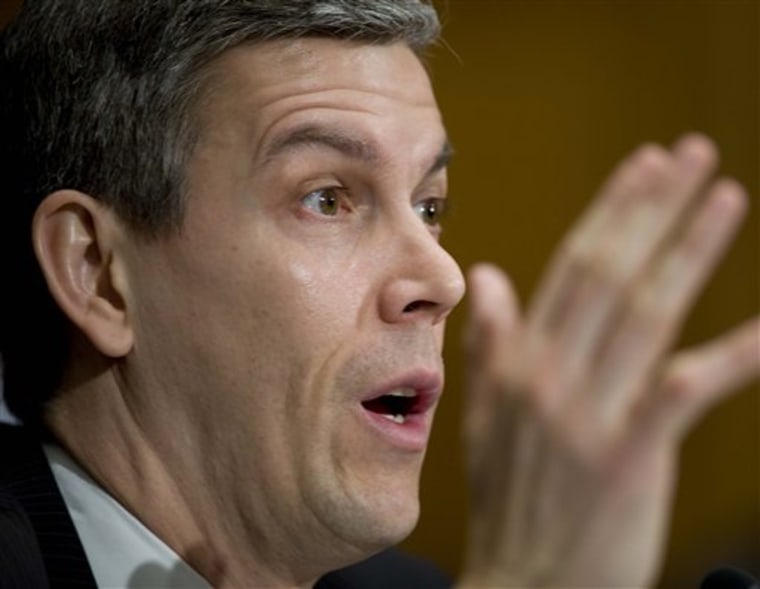Barack Obama's choice for education secretary, Arne Duncan, said Tuesday that the No Child Left Behind law should stop punishing schools where only a handful of kids are struggling.
At his Senate confirmation hearing, Duncan said kids with disabilities or kids learning English might struggle while the rest of the students make gains. But No Child Left Behind requires progress across every group, even special education kids or English language learners.
"Let's not take too blunt an instrument to an entire school," Duncan said. "Those teachers are doing a Herculean job, and we need to recognize that. We need to reward that."
The education community is watching closely to see how Obama will proceed on President Bush's No Child Left Behind law. Obama has pledged to overhaul it but has been vague about how far he would go.
School reform advocates who want to keep the law have been heartened by the selection of Duncan, a big-city schools chief they view as a kindred spirit. Duncan has run Chicago public schools for the past seven years.
Yet it was hard to pin down exactly where Duncan stands on some controversial issues. His argument that the law is too punitive is made by teachers' unions and other critics who want to dump No Child Left Behind.
At the same time, Duncan praised an idea unions have resisted, the idea of teacher pay raises tied to student performance. Duncan started a performance-pay program in Chicago with federal dollars from the Education Department.
"That's something that I want to look at, to not just support but also potentially increase," Duncan said. "We can't do enough to reward and recognize ... excellence."
Duncan, 44, introduced his wife and children to the Senate Health, Education, Labor and Pensions Committee, saying his interest in schools is obviously more than professional.
At one point, Duncan reached behind him to ruffle the hair of his 4-year-old son, Ryan, who spent the hearing quietly drawing with his sister, Claire, 7. Their mother, Karen, sat between them.
The committee's chairman, Sen. Edward M. Kennedy, D-Mass., did not attend the hearing. Kennedy is battling a malignant brain tumor.
No Child Left Behind prods schools to improve test scores each year, so that every student can read and do math on grade level by the year 2014. It was due for a rewrite in 2007, but the effort stalled. Lawmakers hope to try again within the next couple of years.
The law passed with bipartisan support in 2001 but is deeply unpopular today. Critics say the law's annual reading and math tests have forced subjects like music and art from the classroom and that schools were promised billions of dollars that never arrived.
And they say the law is too punitive toward struggling schools; nearly 36 percent of schools failed to meet yearly progress goals in 2008, according to the Education Week newspaper.
That means millions of children are still a long way from reaching the law's ambitious goals.
Duncan worked in Chicago schools under former schools chief Paul Vallas after heading an education nonprofit. Before that, he played professional basketball in Australia, where he worked with underprivileged kids as a social worker. He grew up working in his mother's tutoring program on Chicago's South Side.
In Chicago, Duncan managed to raise test scores and graduation rates, and he improved the quality of teaching.
His critics, however, say he shouldn't get credit for better test scores because they improved before he took over and state tests became easier during his tenure. Parents who opposed his aggressive school closings say they were disruptive to kids.
The education nominee is a longtime Obama friend who has played pickup basketball with the president-elect since the 1990s.
